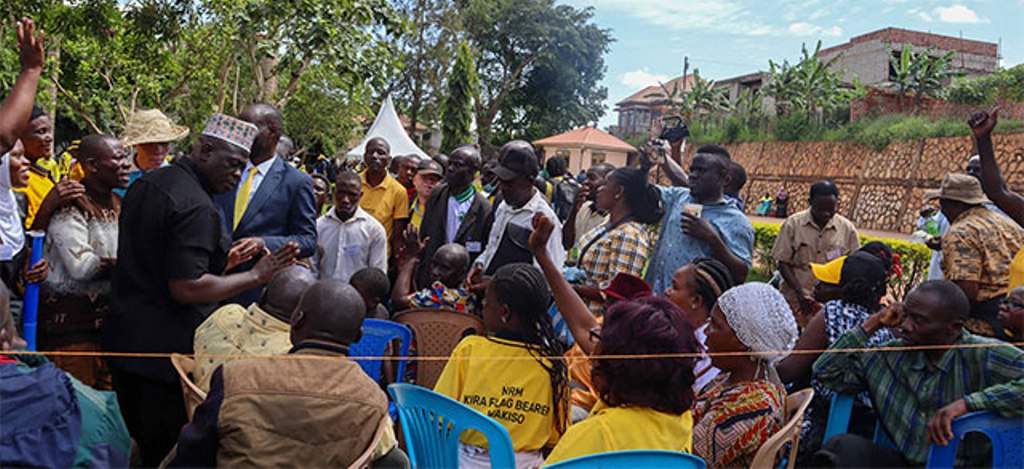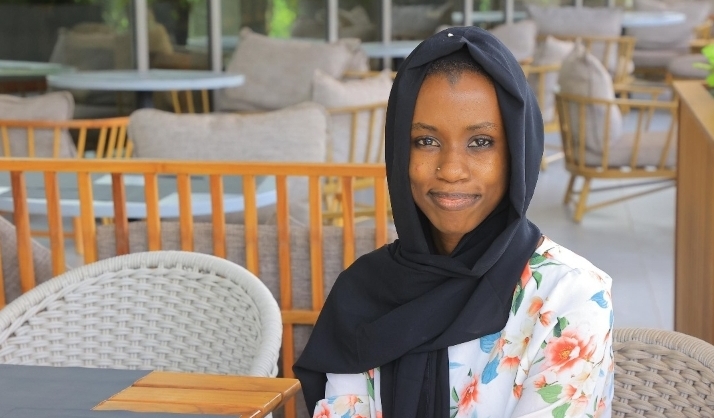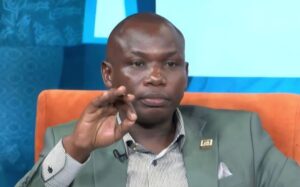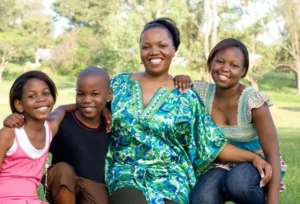News
Violence against journalists rises as Uganda heads into general elections

It was a local election, and, for most of the day, it was peaceful, says Huzaifa Mugerwa, a young journalist covering voting for the first time.
But as the day of voting wrapped up, Mugerwa says, a masked man kicked a ballot box. The police watched as people started shouting, then men in military uniforms took the masked man away. People began to throw stones at the military. Then, he says, soldiers began to beat people. Two more military vehicles showed up, with more soldiers.
Mugerwa livestreamed the event until he was approached by some masked men who asked who he worked for.
“He took my recorder, stand, and camera, lifted me by the pants so only my toes could touch the ground, and dragged me to a van,” Mugerwa says. Inside, he says, were two other journalists. Mugerwa says he was blindfolded, interrogated, and beaten.
“They asked if I was working for Bobi Wine,” Mugerwa says, referring to the controversial activist, singer, and politician.
This continued for six or seven hours, he says, until he was tossed from the vehicle.
Violence against journalists, long a threat and often a reality, has worsened as Uganda heads toward general elections in January 2026. Mugerwa and others worry that the violence and intimidation by security forces will deter adequate and true coverage of the elections and threaten public access to vital information.

Emmanuel Kirunda, secretary general of the Uganda Journalists Association, says that 33 journalists were attacked by armed forces during a two-day period in March while they covered the same election that Huzaifa covered.
“This forced many media organizations to suspend covering the election, calling [in] their reporters because it wasn’t safe anymore,” he says.
Daniel Kalinaki, general manager of editorial at Nation Media Group in Uganda, a leading private media group, posted on X that the organization’s journalists would be pulled from coverage of that same election because they were targeted and attacked by armed soldiers.
Chris Magezi, acting spokesperson of Uganda People’s Defence Forces — Uganda’s army — says violence against journalists during that election was a result of ineffective coordination between the military and the media. Better coordination is needed, he says, to avoid violence in the future.
Magezi says militant politicians with the National Unity Platform, the leading opposition party led by Bobi Wine, whose legal name is Robert Kyagulanyi Ssentamu, are responsible for the violence.
“The radical NUP, they have been assaulting other people who they think don’t support their boss,” he says, adding that such conduct forces the police to call the military for backup.
Gen. Muhoozi Kainerugaba, chief of the Defence Forces — and President Yoweri Museveni’s son – in 2022 promised in a post on X that journalists “will feel us soon. We will crush you.”
Julius Mucunguzi, spokesperson for the Uganda Electoral Commission, says the media plays a critical role in ensuring free and fair elections, but the commission can’t guarantee the safety of journalists.

The best thing, he says, is for journalists to work as a collective. “The electoral commission alone can’t stop brutality,” he says.
Violence against journalists in Uganda dates back many decades. In 1944, Daudi Mukubira, founder of Buganda Nyaffe, a publication that accused the British colonial regime of enslaving Black Africans through unjust policies, was arrested and tried. The attack on press freedom and journalists continued even in post-independence governments with the closure of media organizations and murders of journalists during the Milton Obote and Idi Amin regimes of the 1960s, 1970s, and early 1980s.
There’s no indication that control of and violence toward media will end now, even in light of a 2024 High Court ruling that attacks on journalists are unconstitutional, says Kirunda, of the Uganda Journalists Association.
There is “little or no will from armed forces to protect journalists,” he says.
Miracle Ibrahim, a reporter with Top TV, says he nearly lost his eye while reporting on an election in February. Members of the Joint Anti-Terrorism Task Force approached him, and someone hit him hard in the face, he says.

“I do remember touching where I had been hit and feeling a hole instead of my eye,” he says, adding that he was soaked in blood. He was taken to a local hospital and underwent surgery. To his surprise, he says, doctors told him he would keep his eye and recover his sight. He says he still, at times, feels terrible pain.
He says he will continue working as a journalist because he loves his job.
“We don’t have any issues with the military,” he says. “We are not armed.”
Mugerwa also says he’ll remain in journalism, but only because there are few jobs in other fields.
“If I can find another job that pays me well, I will definitely leave journalism,” he says. “The risk, the pain, the inhuman treatment by authorities [who are] supposed to protect me when I am doing my job, isn’t worth it.”
News
Conversation With Uganda’s Student Tech Pioneer: Kusiima Saruah

In a country where the youth make up the majority of the population, their voices are often overlooked in critical governance processes. But a bold new wave of innovation led by young minds is reshaping how civic participation and leadership are cultivated, starting right at the grassroots.
One such trailblazer is Kusiima Saruah Kyaligonza, a 21-year-old software developer and university student at Uganda Martyrs University, whose work caught our attention. In a recent conversation with Amiri Wabusimba, Kusiima shared her vision, journey, and the powerful potential of digital platforms to transform Uganda’s democratic future.
Inspired by the challenges she observed in university elections, including voter mistrust, low student participation, and systemic apathy, Kusiima developed a digital voting platform tailored for student elections. She aimed to rebuild faith in electoral processes, beginning within schools. “Watching the university’s elections, I saw the frustration from students.
I wanted to create a space where students feel their voices matter and their votes count,” she explained. “If we instill that mindset early, we raise a generation that demands integrity and leads with purpose.” Her platform addresses specific electoral issues such as vote rigging, low turnout, and favoritism common even in student leadership contests by promoting transparency, fairness, and accessibility.
Kusiima’s work is part of a broader movement of youth-led innovation in Uganda. “We often say the youth are the leaders of tomorrow,” she noted, “but many of us are already leading today through art, technology, advocacy, and innovation. What we need is support, not just applause.” Her initiative has been well received by fellow students, who report feeling empowered, heard, and more engaged in school governance. According to Kusiima, the impact goes beyond elections; it sows seeds of responsible leadership.
Asked whether digital voting could work on a national level, Kusiima responded with conviction. “Yes, it can if we commit to building digital literacy, infrastructure, and, most importantly, trust. Leaders must stop fearing technology and start embracing its potential.” If given a chance to address the Electoral Commission or national leaders, Kusiima says she would urge them to invest in youth innovations and adopt transparent systems that simplify civic participation without compromising credibility.
As Uganda continues to grapple with questions around electoral transparency, declining public trust in democratic institutions, and low youth participation, innovations like Kusiima Saruah’s digital voting platform couldn’t have come at a better time, especially as the country prepares for the 2026 general elections. Her initiative offers more than a technological upgrade, it’s a catalyst for cultural change in how Uganda engages its citizens from an early age. By digitizing trust, simplifying participation, and empowering youth to lead, this platform embodies the future of accountable governance.
This is not just a student project; it’s a national opportunity waiting to be embraced. It is time for Uganda’s government, Electoral Commission, civil society, and development partners to see this for what it is: a smart, scalable, homegrown solution that reflects both the challenges and the aspirations of a new generation.
If Uganda truly seeks to uphold the principles of free and fair elections in 2026 and beyond, then supporting innovations like Kusiima’s is not optional; it is essential.
-
Top Stories2 days ago
Just in: PLU leaning to NRM, Withdraws From Party Primaries With 22 days Remaining to Elections.
-
Top Stories5 days ago
Suspected female suicide bomber killed in Kalerwe
-
Top Stories5 days ago
NUP Clears Kyeyune Pafuladiito For Mubende District Chairperson Race.
-
Top Stories5 days ago
NUP Goes For Buwekula South MP Seat Blesses Edward Ssempira.
-
Top Stories2 days ago
Museveni Approves Flyover Along Kampala-Jinja Highway to Protect Mbalala Industrial Park Workers
-
Top Stories4 days ago
Uganda’s Open Currency Policy and the Decline of the Shilling
-
Top Stories3 days ago
Dr. Ssemugenyi petitions Constitutional Court over UPDF Amendment Act
-
Top Stories1 day ago
Police fire teargas and water cannon at protesters in Kenya as thousands take to the streets

















